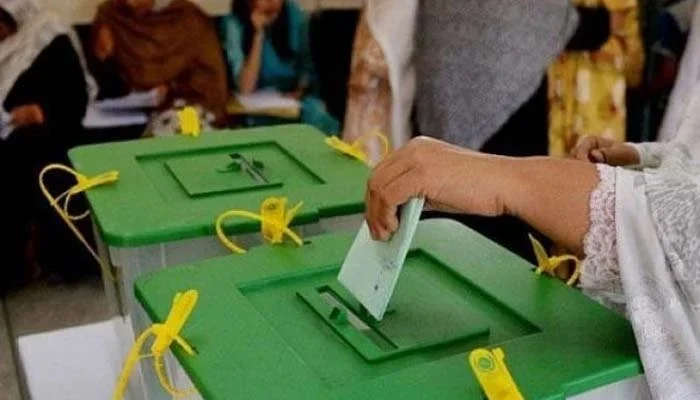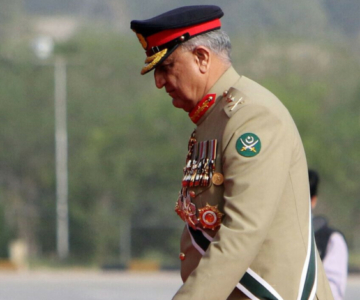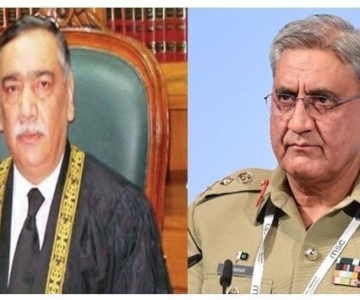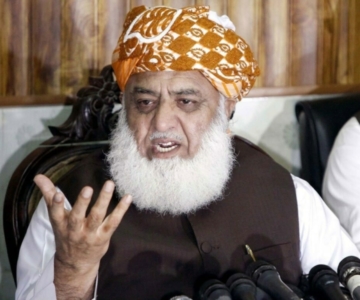July 15, 2018: Election 2018 — Seven cautionary signs
Under ordinary circumstances, the election campaign should have peaked by now with political parties and their candidates conducting corner meetings, door-to-door contact and polling day planning. But this is not the case for there has been looming uncertainty, turbulence and of late violence marring the election season. Amid this chaos, the military and the judiciary have appeared as the arbiters of political process. While there are caretaker administrations, an election commission and the media networks but they all appear to be somewhat marginal.
First, the calls for a level playing field are redundant now. The two main parties Pakistan Muslim League-Nawaz (PMLN) and Pakistan People’s Party (PPP) have complained of ‘manipulation’. This is nothing new and well-established trend but this time the PMLN and PPP have not shied away from naming names. Such allegations may be exaggerated but their repetition in public domain is neither good for the army or the democrats. Perceptions matter. Even the idea, howsoever far-fetched, that a professional institution faced with serious security challenges might be favouring a political party, is, simply not in the national interest.
The situation in Balochistan and Khyber Pakhtunkhwa is eerily similar to the 2013 pre-election chaos. It distorts the overall fairness for certain parties under attack and also keeps their voters away from the polling stations
Second, the exit of Nawaz Sharif and his daughter from the political arena through questionable judicial verdicts have increased the public scrutiny – especially in the Punjab – of another institution that is vital for upholding constitutionalism and democratic norms in the country. Sadly, the courts have been politicized in the ongoing tug of war and whether one supports or rejects a verdict[s], the conduct of judges at different levels has invited inordinate negative commentary – especially on social media – concerning the working of the courts.
The accountability process now is a clear stick that is being applied for desired results. Take the case of recent money laundering scandal that implicated PPP supremo Asif Ali Zardari. All of a sudden, both the federal investigation agency and the Supreme Court summoned Zardari and his sister in quick succession. Later, the matter was virtually shelved after much media hype and speculation as to what was happening behind the closed doors. Was it part of a deal under consideration or a sudden awakening of the accountability mechanisms against the former President remains unclear. In short, the national accountability bureau and the courts set up to prosecute corruption cases appear arbitrary and selective.
Third, the return of lethal terror attacks – in Bannu, Mastung and Peshawar – killing and injuring hundreds right before the elections is both ominous and a glaring failure of law enforcement agencies that should have been extra-vigilant in such times. The situation in Balochistan and Khyber Pakhtunkhwa is eerily similar to the 2013 pre-election chaos. It distorts the overall fairness for certain parties under attack and also keeps their voters away from the polling stations. In the aftermath of recent violence, the resolve shown by the Chief of the Army Staff (COAS), Gen Bajwa to tackle terrorism is noteworthy. And once again, the country looks towards the military to re-establish peace.
Fourth, the caretaker administrations – at the Centre and in the provinces -appear to be ineffective and not in charge of the pre-election arrangements. Whether it was the handling of Nawaz Sharif’s return on July 13, or undue crackdown on PMLN workers in the Punjab, the overreaction was ill thought out. To the extent that it had the opposite effect. Many questioned as to what was going to happen if a few thousand people actually arrived at the airport to receive their convicted leader? The caretaker government in the Punjab appeared clueless and worse incompetent in dealing with the July 13 event. This is another reason why politicians need to be caretakers and not inexperienced academics or cynical retired bureaucrats.
Fifth, the credibility of media industry especially its electronic arm, appears to be at an all-time low. Individual journalists have complained that their employers i.e., the TV channels did not air content, which they prepared after much hard work. And at least three television journalists have spoken about ‘instructions’ not to air anything on PMLN workers’ rally in Lahore the day Nawaz Sharif arrived. Who is issuing such instructions and why? These questions are important for in the presence of a robust social media, conventional modes of censorship are becoming irrelevant. However, it is the disunity in the ranks of media owners and journalists that is enabling this state of affairs. A fair election is simply not possible without a free media.
Sixth, the polling arrangements that are being finalized by the ECP are extraordinary to say the least. The deployment of 370,000 security personnel, perhaps the largest number in recent times raise concerns even if there is a reason not to be alarmed. Similarly, the powers given to security personnel have also been under discussion and the scope of such powers appears to be broader than expected. In fact, the use of judicial powers by executive arm of the state is intriguing especially since the separation of the two branches since the reforms carried out during Musharraf era.
Lastly, the disarray within the ranks of the political parties, their inability to stand up for media freedoms, appropriate election arrangements and resist crackdowns are not conducive to a rule-based electoral game. In fact, they are allowing for whatever real or feared ‘manipulation’ and appear obsessed by win-at-all-costs axiom. Parties’ ruptured engagement with the public can be gauged by the fact that manifesto releases were the relatively unimportant tasks in their to-do list. It has been a race for saving or snatching electables and finding potential deals with the establishment.
The judicial-military combine will steer the elections and power transfer after the July 25 elections. There is widespread respect for and trust in the armed forces. Time and again surveys have shown how Pakistanis look up towards the army as the neutral player. This makes the next few weeks even more onerous for the military leaders. The army should pay heed to critical voices of PMLN workers in the Punjabi heartland. Sharif may be jailed and out of the race but he has unleashed a new dynamic in urban Punjab. We are entering into a new phase of politics that should not be ignored by the most powerful institution of the country.



